In a time of rapid globalisation and industrialisation, education is more than just a system to transfer knowledge from one to another; it is a launchpad to equip learners with the necessary skills to navigate and excel in the ever-complex twenty first century world.
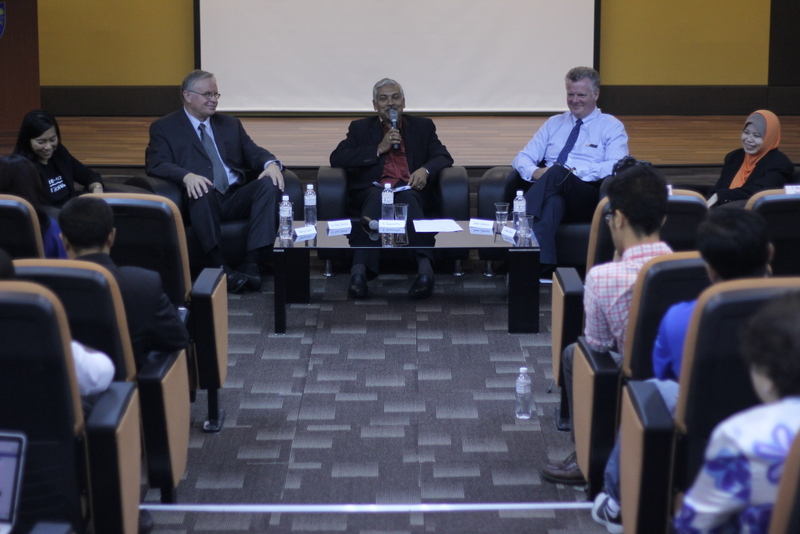 6 November 2014, Petaling Jaya, Malaysia – The Global Peace team sees a need to introduce a profound definition of holistic education known to very few among members of the public; a public forum is hosted in University of Malaya to explore the concept of going beyond standardised test scores, treating learners as unique individuals and share best practices currently being implemented across the education sector.
6 November 2014, Petaling Jaya, Malaysia – The Global Peace team sees a need to introduce a profound definition of holistic education known to very few among members of the public; a public forum is hosted in University of Malaya to explore the concept of going beyond standardised test scores, treating learners as unique individuals and share best practices currently being implemented across the education sector.
“ The system (I mean us, humans) have to catch up with technology,” said Mr.Puniamurthy, deputy registrar of University of Malaya and moderator of the day. “As of today, there are more than 40,000 teachers in Malaysia and the nation simply has not enough resources to further develop and update their expertise,” he continued. He also stresses on the importance of technology integration in education before introducing four powerhouse panellists, which are Dr. Tony Devine of Global Peace Foundation, Ustazah Roslina of SMK Segambut Jaya, Mr. James Johnston of LeadEd Services and Miss Rahayu (surname) of Google Malaysia.
Dr. Tony Devine, Vice President of Global Peace Foundation International
The session took flight with Dr.Tony, Vice President of Global Peace International and Founder of the Character and Creativity Initiative. He spoke about failure in the education system fuels economic under-development, corruption and countless social problems; the way out is not to improve but transform education. Strong foundation of interest and learning capacity needs to be laid in the first two phases of education, which are primary and secondary schools before learners are being propelled towards a specialisation in universities. The key to successful and meaningful learning is to master the art of working in teams.
On a macro level, education transformation is a collective impact, which requires a broad cross-sector coordination in order to sustain lasting change. Educators of today need to connect and work alongside surrounding communities, businesses, for-purposed organisations and the government to maximise learning outputs of a learner. As a result, a trend is spotted across regions for the past decades, which more investments are pumped into the education system to hire and develop teachers and have them lead smaller classes.
The underlying premises of CCI are that everyone have the potential to be good, naturally creative and curious, with more attention given to each individual- it is to guarantee significant improvement in both grade points and character development.
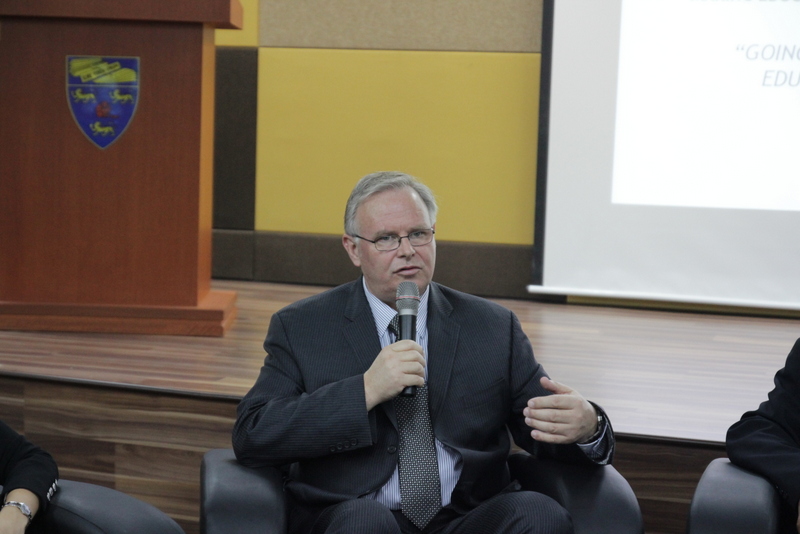
Dr. Tony stressed on the importance of teamwork and drew Google Incorporated as an example. “With more than 54,000 employees around the world. These people work in small teams to solve hundreds and thousands of problems daily,”
He also emphasized: “Schools simply do not work because learners are seated in rows facing the teacher, all you see is the back of your friend’s head for twelve years!”
With the mindset changed, educators are to nurture competencies, cultivate the art of working in teams, instilling sense of initiative in our leaders of the future- just like how the world is currently working.
Ustazah Roslina, Arabic Language Teacher of SMK Segambut Jaya
Dr. Tony Devine’s points are backed up by Ustazah Roslina, who is an Arabic language teacher and CCI innovation team member of SMK Segambut Jaya, enrolment to her school are mostly boys selected based on good grades in their primary school examination. She shared her concerns when advanced technology and gadgets are introduced to the school in 2011: “Negative charges are contagious, there was a significant drop in disciplinary level and academic results,”
It concerns her, especially in getting students to be interested in the Arabic language.
The creative Ustazah Roslina designed a technique integrating melody from student’s favourite songs combined with the Arabic language syllabus. The results are astounding, her classes are more focused, works are delivered on time and students embody positive attitude and body languages. Her moment of enlightenment occurred when she was chosen to attend a CCI workshop in August this year where she absorb best practices and latest innovative ways of engaging students and fellow teachers for a school-wide transformation.
When asked for her secret recipe, she simply said “It is never enough until you start doing it! Teachers are equipped with ample knowledge and information but it takes a lot initiative and dedication to sustain the efforts,” – this is where a strong peer support system is helpful.
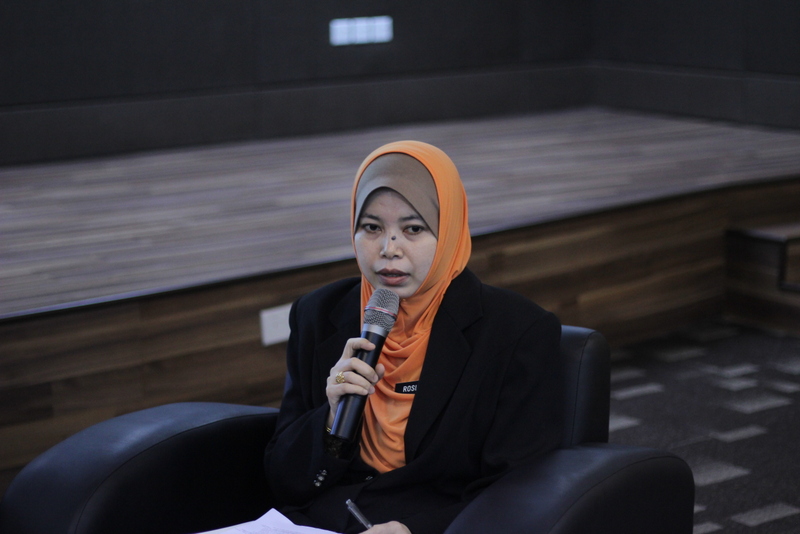
The moderator took the stage and applauds the courage of Ustazah Roslina in admitting her weaknesses as most experienced educators failed to see their own shortcoming. Many teachers want to change but have the fear of the unknown, the fear that they will be criticised for their attempts of innovation.
Mr. James Johnston, Research and Development Manager of LeapEd Services
The next speaker is the Research and Development Department Manager of LeapEd Services, Mr. James Johnston. He has been a principal for more than 27 years and carries over extensive experience in curricular, resources and community development to his new role in Malaysia, which is to help build trust schools. Trust School is a blueprint requested by the government to innovate education, it aims to transform selected low and high performing schools scattered across both rural and urban areas.
It all begins with a school-to-school baseline study, which schools are given tools and a point system to measure their journey and achievable results in the next 5 years. There are three major components in transforming schools, first is leadership which refers to leaders and school administrators, second is teachers followed by third which is communities. These three are to put together and design a unique syllabus to prepare students for the workplace in the future. His personal mantra of education is: “Student-focused. Do you have teachers that aren’t student focused, don’t like children or shouldn’t be in the workforce? Scotland has a General Teaching Council and we get rid of them, those who are not up to the standard, they don’t get to be in the profession.”
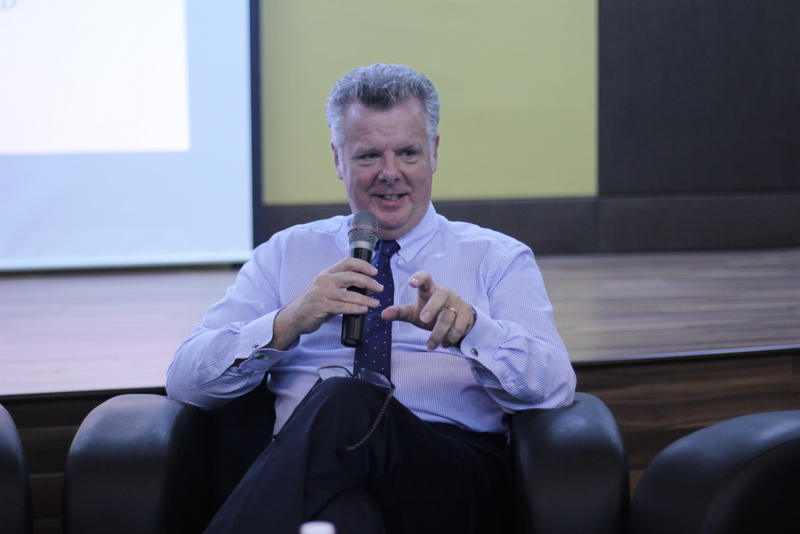
Miss Rahayu Ramli, Education Programme Manager of Google Malaysia
The last speaker is Rahayu, the Education Programme Manager of Google Malaysia. She started off with a strong kick on technology being a big shift but the bigger shift happened back in the 1400s when printing technology is founded. At the new age of printing, the age of seven is considered adults; the availability of print enables jobs, which the society never knew needed.
From there, we entered the age of hyper-connection, advancement in digital technology has changed how we absorb and perceive information as we are constantly bombarded by information, humans become selective what to take in.
“My personal passion about education is to break inequality,” said Rahayu with conviction. Her vision to bridge gaps in the existing education system and what is used by the society. The question is if we are providing learners access to technology blindly or with the right degree of integration.
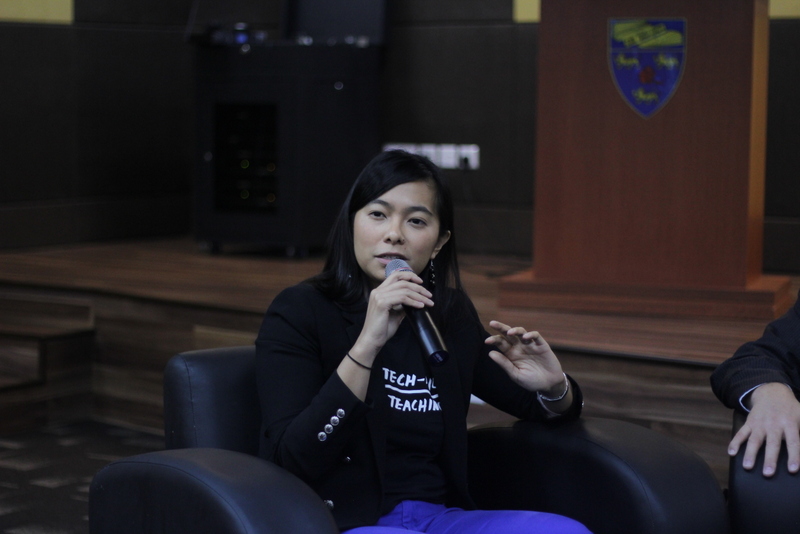
During her short speech, Rahayu admitted that many thought she was crazy for thinking to turn down a job offer from Google before she finally decided to join up. What convinced her was Google’s research into robotics and military robots. She wasn’t interested in taking over the world with them but more towards the underlying concept of robotics and artificial intelligence – how do we educate people that technology can be integrated into education without having the entertainment bits of it becoming a distraction to students?
With a smile, Rahayu also shared on how Google was a company that runs on insane ideas and the belief that no idea is a silly one and no effort is a wasted one. Every failure is taken as a lesson learned from. This is what convinced her, Google was right for her because as she said: “Why wouldn’t I join up with a company that lets me ask questions, test out crazy ideas and aren’t afraid to fail?”
Ultimately, her concern was with this much information flooding the world through technology in this time and age of hyper-connectivity, how do we teach our kids, how do we teach our educators to sift through the information and absorb it. She also shared her strong passion in wishing to see a classroom revolutionized beyond the ‘prison’ it is considered to students these days, with technology.
“It’s time we convinced our teachers to do things differently and that it’s okay to be different,” she said with quiet conviction as an end to her speech.
With all these great ideas and thoughts being shared, it was definitely a pleasure to see how well the audience connected with the passion of the panellists and their wish to change the world of education because it is a sector, as Mr. Puniamurthy said as a closing to the forum, that has yet to be disrupted and it’s going through a stage of disruption at this point in time. However, we should keep in mind his wise words: Humanity doesn’t evolve in a linear way but rather in a cyclic method, with its ups and downs and that is what essentially makes us all human.
Editor’s Thoughts
It was truly amazing to see how people of different backgrounds came together in one place because they all had the same great dream: seeing a change in the way education is being taught to the future generation. It has come a time where technology is steadily becoming a great part of our lives, it has come a time where globalization has disconnected us so how then do we keep that bit of humanity alive and present?
And truly, what better way do we teach people how to be human beings than through education. Learning is a process that never stops, as humans; we will always be learning new things in every point in our lives.






